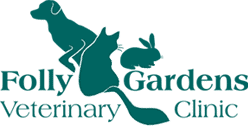New research has shown that rabbits have become the number one pandemic pet with sales increasing more than 200%.
Rabbits are often considered a lower maintenance and low cost option in comparison to puppies and kittens but rabbit ownership, as with any pet, comes with responsibility and needs careful thought. Food, bedding, housing, and supplies need planning for as well as veterinary care, be it preventative (vaccinations etc) or emergency treatment.
Many of the common problems seen in rabbits may develop from rabbits being fed an inappropriate diet. It is extremely important that you make sure your rabbits are eating the full range of food provided and passing healthy droppings, every day.
Being prey animals, rabbits are good at hiding signs of ill-health. Therefore, it is important to get into the habit of completing some regular health checks on your rabbits and why vet check ups (three times a year) are really important to help avoid disease.
Our Healthplan- Folly Care Club includes two checkups a year and an additional floating consultation if required. Not only will this help you spot any potential problems early on, regular handling will help strengthen your bond.
We advise checking your rabbits ears, eyes, teeth, bot-tom, feet, fur and nails on a weekly basis. If anything is found of concern; call one of our team for advice.
Prevention is better than cure when it comes to keeping your rabbit healthy. Talk to your vet about your rabbits’ ideal weight.
Make sure your rabbits are getting plenty of exercise and are on a good, balanced diet which we are happy to advise on.
With the advent of warmer weather a condition of note is Flystrike. Flystrike which occurs when flies lay their eggs in soiled fur. The eggs hatch into maggots which chew their way into the rabbits skin. A good diet can help to prevent obesity, dental disease and diarrhoea and guard against fly strike.
Myxomatosis and both strains of Rabbit Viral Haemorrhagic Disease (RVHD1&2) are life-threatening diseases and your rabbits should be vaccinated at the earliest opportunity. They are spread by blood-sucking insects, like fleas and mosquitoes. Ask us for more details on these vaccinations and how to make sure they are kept up to date.
Remember the golden rule: if your rabbit’s behaviour or eating/drinking pattern changes you should seek the advice of Folly Gardens Vets as soon as possible.






Over 30 years of caring for our clients pets’ well-being